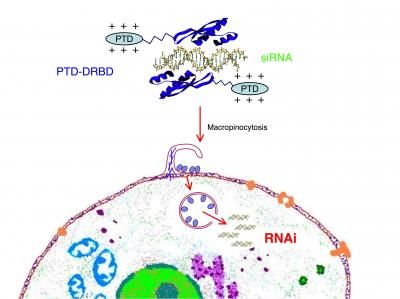UCB and Imclone Systems enter into worldwide partnership for CDP-791 therapy targeting the development of tumor vasculature
UCB and ImClone Systems Incorporated announced that they have entered into a worldwide strategic partnership for the development and commercialization of CDP-791, a novel, investigational antibody targeting the vascular endothelial growth factor receptor-2 (VEGFR-2) that is currently being developed by UCB.
VEGFR-2 is known to regulate the formation of blood vessels in tumours (angiogenesis), allowing cancer cells to receive nutrients and maintain growth. CDP-791 takes the novel approach of targeting and blocking VEGFR-2 on blood vessel cells with a PEGylated diFab antibody and thus interferes with the development of tumour vasculature. This mechanism has been shown to interfere with tumour vasculature in preclinical models. CDP-791 completed Phase I testing earlier in 2005 in patients with refractory solid tumours. The study comprised six ascending dose groups each given CDP-791 intravenously once every three weeks. The study results showed that CDP-791 was well tolerated and met its safety endpoint at all dose levels. No dose-limiting toxicity or signs of immunogenicity were detected. A randomized Phase II study in non-small cell lung cancer is scheduled to start in the coming weeks.
Under terms of the agreement, UCB and ImClone Systems will share equally all agreed upon development costs for CDP-791 as well as worldwide profits derived from its commercialization in indications jointly pursued by the parties. ImClone Systems will also receive an incremental single-digit royalty on net worldwide sales for such labeled indications. ImClone Systems has exclusive commercialization rights to CDP-791 in North America, with UCB receiving such rights in Europe, Japan, and the rest of the world.
Topics
Organizations
Other news from the department business & finance

Get the life science industry in your inbox
By submitting this form you agree that LUMITOS AG will send you the newsletter(s) selected above by email. Your data will not be passed on to third parties. Your data will be stored and processed in accordance with our data protection regulations. LUMITOS may contact you by email for the purpose of advertising or market and opinion surveys. You can revoke your consent at any time without giving reasons to LUMITOS AG, Ernst-Augustin-Str. 2, 12489 Berlin, Germany or by e-mail at revoke@lumitos.com with effect for the future. In addition, each email contains a link to unsubscribe from the corresponding newsletter.






















































